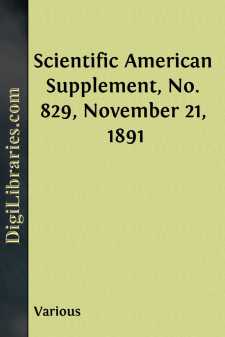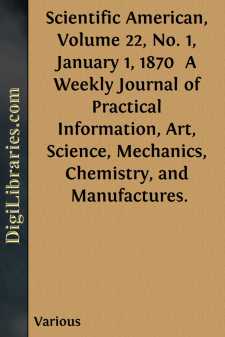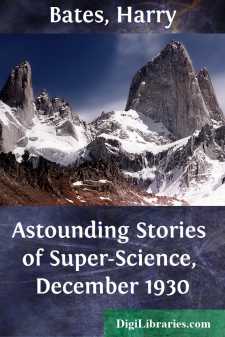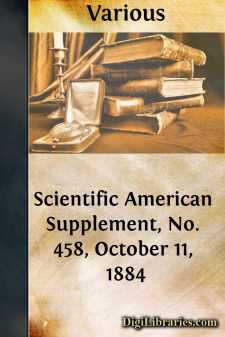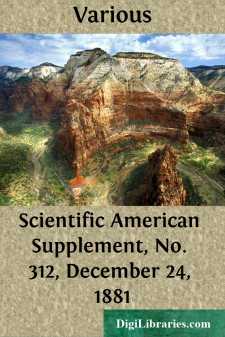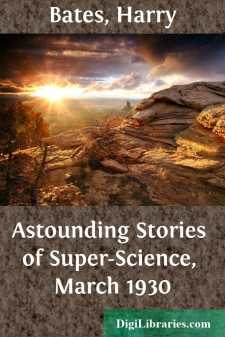Periodicals
- Art 27
- Children's periodicals 59
- Entertainment 5
- Food/Wine 2
- Games/Humor 455
- General 661
- Health 1
- History 53
- House/Home 1
- Regional 62
- Science/Nature
- Transportation 10
Science/Nature Books
Sort by:
by:
Various
THE IMPORTANCE AND NATURE OF REFORMATION FROM SIN. This know also, that in the last days perilous times shall come; for men shall be lovers of themselves, covetous, boasters, proud, blasphemers, disobedient to parents, unthankful, unholy, without natural affection, truce breakers, false accusers, incontinent, fierce, despisers of those who are good, traitors, heady, high-minded, lovers of pleasure more...
more...
by:
Various
Science needed two thousand years to disentangle the earth's orbital movement from the revolutions of the other planets, and the incomparably more arduous problem of distinguishing the solar share in the confused multitude of stellar displacements first presented itself as possibly tractable a little more than a century ago. In the lack for it as yet of a definite solution there is, then, no...
more...
by:
Harry Bates
An officer of the Special Patrol Service dropped in to see me the other day. He was a young fellow, very sure of himself, and very kindly towards an old man. He was doing a monograph, he said, for his own amusement, upon the early forms of our present offensive and defensive weapons. Could I tell him about the first Deuber spheres and the earlier disintegrator rays and the crude atomic bombs we tried...
more...
by:
Various
SUGAR MAKING IN LOUISIANA. The New Orleans Times contains, in a late number, an account of the manufacture of sugar as conducted on the Poychas estate, from which we extract portions containing the essential particulars of cane sugar making as conducted in the southern portions of the United States. "Reaching the Cane shed, the crop, dumped into piles, is received by a crowd of feeders, who place...
more...
by:
Various
DR. MORELL MACKENZIE. The name of the great English laryngologist, which has long been honored by scientists of England and the Continent, has lately become familar to everyone, even in unprofessional circles, in Germany because of his operations on the Crown Prince's throat. If his wide experience and great skill enable him to permanently remove the growth from the throat of his royal patient, if...
more...
by:
Harry Bates
batalões turned from the open waters of the lower Tapajos River into the igarapé, the lily-smothered shallows that often mark an Indian settlement in the jungles of Brazil. One of the two half-breed rubber-gatherers suddenly stopped his batalõe by thrusting a paddle against a giant clump of lilies. In a corruption of the Tupi dialect, he called over to the white man occupying the other frail craft....
more...
by:
Various
THE FRANKFORT AND OFFENBACH ELECTRIC RAILWAY. The electric railway recently set in operation between Frankfort and Offenbach furnishes an occasion for studying the question of such roads anew and from a practical standpoint. For elevated railways Messrs. Siemens and Halske a long time ago chose rails as current conductors. The electric railway from Berlin to Lichterfelde and the one at Vienna are in...
more...
by:
Various
IMPROVED FIFTEEN TON CRANE. IMPROVED FIFTEEN TON TRAVELING CRANE.The machine illustrated on first page has been constructed for Port Alfred Harbor, this being one of several harbors now being made by Sir J. Coode in South Africa. The pier for the construction of which the crane will be employed will consist of concrete blocks laid on what is known as the "overend system." The blocks, being...
more...
by:
Harry Bates
onfound it, Carnes, I am on my vacation!” “I know it, Doctor, and I hate to disturb you, but I felt that I simply had to. I have one of the weirdest cases on my hands that I have ever been mixed up in and I think that you’ll forgive me for calling you when I tell you about it.” How could a human body be found actually splintered––broken into sharp fragments like a shattered glass! Once...
more...
by:
Harry Bates
Two miles west of the village of Laketon there lived an aged recluse who was known only as Old Crompton. As far back as the villagers could remember he had visited the town regularly twice a month, each time tottering his lonely way homeward with a load of provisions. He appeared to be well supplied with funds, but purchased sparingly as became a miserly hermit. And so vicious was his tongue that few...
more...



